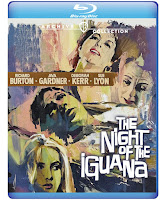Blu-ray Releases of the Week The Banshees of Inisherin
(Searchlight)
In Martin McDonough’s newest blackly comic fable, two longtime friends have a falling-out: Colm decides one day that he doesn’t want to be best buds with Pádraic ever again, and he goes to extremes to ensure that that happens. McDonough’s dialogue is always clever and colorful (lots of “fecks”), the performances of Colin Farrell and Brendan Gleeson as the former friends are wise, authentic and full of feeling—and Kerry Condon, as Pádraic’s devoted spinster sister Siobhán is just as good—and the locales look breathtaking. But it’s all at the service of a strained metaphor for how relationships—whether personal or geopolitical—can easily fray and it never rises above the allegorical, to its ultimate detriment. The film looks lovely in hi-def; extras include deleted scenes and an on-set featurette.
(Grindhouse Releasing)
Rescued from obscurity, Peter Traynor’s 1977 slow-burn thriller—originally made in 1974 but held back due to Traynor’s legal troubles—stars Colleen Camp and Sondra Locke as crazed young women who make husband Seymour Cassel pay for letting them into his house while his family’s are away: they tie him up and abuse him psychologically and physically. This has been both touted as feminist and derided as exploitative, and it’s a little of both, although Traynor only occasionally crosses from gratuitous violence and sex to a meaningful study of aberrant behavior. The film’s new hi-def transfer has nice grain; extras include new Camp, Locke and Traynor interviews, audio commentaries and a similar-themed, equally obscure 1973 feature, Little Miss Innocence.
(Cohen Film Collection)
Joan Micklin Silver’s 1998 screwball comedy surveys the ultimate dysfunctional Jewish family: Jerry Stiller can’t believe that longtime wife Anne Meara is leaving him—his insistence on keeping a fish in the bathtub is the last straw—beginning a domino effect of recriminations among the rest of the family. Silver has assembled a top-flight cast—including Mark Ruffalo at the beginning of his career, Missy Yager, Jane Adams and Doris Roberts—but the humorous situations are middling and mild, with little observational insight. There’s a fine hi-def transfer; lone extra is a Q&A with Silver and scriptwriters John Silverstein and David Chudnovsky.
On the Yard/A Walk on the Moon (Cohen Film Collection)
Joan Micklin Silver’s husband, Raphael Silver, was also a director, and this set collects two of his features, scruffy films distinguished by their authenticity. 1978’s On the Yard, set in a prison, follows the daily interactions of prisoners and those guarding them, while 1987’s A Walk on the Moon follows an idealistic American trying to save the world as a Peace Corps volunteer in Central America. There are moments, but the low budgets have their limits; best are performances by John Heard (Yard) and Patrice Martinez (Moon). Both films have good hi-def transfers.
Stravinsky’s Mavra/Tchaikovsky’s Iolanta (Bayerischen Staatsoper)
Two operas by Russian composers written three decades apart—Stravinsky’s Mavra in 1922 and Tchaikovsky’s Iolanta in 1892—are uneasily stitched together in Axel Ranisch’s fitfully satisfying 2019 Munich staging. While visually interesting and musically lovely, the ultimate point of Ranisch’s conceit remains opaque. Beautifully singing the heroine roles are Anna El-Kashem in Mavra and Mirjam Mesak in Iolanta, while the scores are sumptuously performed by the orchestra, chorus and children’s chorus under conductor Alevtina Ioffe.
4K/UHD Releases of the Week Highlander
(Lionsgate)
Russell Mulcahy’s original 1986 fantasy—filled with violence and time-travel—has become a tremendous cult hit over the decades, so it’s a no-brainer this has gotten a UHD release. As clunky and even risible as the movie often is—and, with Christopher Lambert in the lead, extremely wooden as well—there’s an undeniable sheen to the visuals that is matched by Queen’s soaring music as in the best MTV videos (which was Mulcahy’s first job). It all looks spectacular in 4K; the Best Buy-exclusive steelbook includes an accompanying Blu-ray disc, bonus interviews and featurettes (with new featurettes on the 4K disc) and postcards.
(Warner Bros)
The first feature to entirely utilize motion-capture animation, Robert Zemeckis’ 2004 holiday movie is as much a slog as it is uplifting: the characters are often irritatingly fake-looking instead of capturing their true essence. There are stunning images galore, but this is an unavoidably repetitive adaptation of a beloved—and short—children’s book. And giving Tom Hanks five roles is four more than he can handle without leaning on his usual tics. The 4K/UHD transfer looks dazzling; extras include making-of featurettes on the accompanying Blu-ray.
In-Theater Release of the Week Going All the Way
(Oscilloscope)
Mark Pellingon’s 1997 adaptation of Dan Wakefield’s novel about GIs Gunner and Sonny returning to small-town middle America in the conservative ’50s has been recut by the director himself—the result is a marginally better but still fairly superficial movie about an era that’s been covered many times. Still, there are enjoyable performances by Jill Clayburgh (R.I.P.!) and Lesley Ann Warren as Sonny’s and Gunner’s moms, respectively, and Rachel Weitz, Amy Locane and Rose McGowan are excellent as the women they bed down. Ben Affleck is unfortunately one-note as Gunner, but Jeremy Davies gives a sensitive, thoughtful portrayal of Sonny.
And Just Like That ...
(HBO)
The long-gestating sequel to Sex and the City came and went just like that without making much of an impression—except for killing off Carrie’s main squeeze, Mr. Big (and just in time too, for actor Chris Noth got cancelled after sexual abuse allegations). The main problem is that, without Kim Cattrall’s Samantha, the dynamic balance among the main characters is severely out of whack: Carrie, Miranda and Charlotte are just not that interesting without her, and that came through in this series’ 10 watchable but forgettable episodes. Sarah Jessica Parker and Cynthia Nixon seem bored, but at least Kristen Davis has a little energy left.
(Distrib Films US)
Director Stefano Mordini’s twisty, Hitchcockian thriller recounts the events leading to the murder of a big wig’s mistress from various points of view, including that of the lawyer trying to make sense of what happened to ensure he gets a fair trial—or is she up to something else? For its first 90 minutes, the fast pace imaginatively suspends viewers’ disbelief as we get caught up in the various possibilities that led to the killing, then it’s all ruined in a final reveal that simply makes no sense. It’s too bad, because it’s done so thrillingly and enacted brilliantly by Riccardo Scamarcio as the suspect and Miriam Leone as his mistress.
The Student and Mister Henri (Distrib Films US)
The late, great French actor Claude Brasseur—who died in 2018—is the main reason to watch this 2016 dramatic comedy about a crusty old widower who, after an independent young woman rents out a room in his apartment, begins to slowly build a relationship with her filled with friction but, later, mutual admiration. Although director Ivan Calberac’s film does little original with this umpteenth iteration of some sort of odd couple that’s thrown together, both Brasseur and Swiss actress Noemie Schmidt do their best to keep this afloat.
Nico Muhly—The Street
(King’s College, Cambridge)
In this work based on the Stations of the Cross, composer Nico Muhly pares the music to the bone, literally, as a solo harp intones the magisterial drama of Jesus’ final walk toward Mount Calvary before his crucifixion. Alice Goodman’s libretto for these 14 movements provides short meditations of hope, and the two discs do present two versions of the work itself. First, following a Bach partita played by harpist Parker Ramsay, is strictly instrumental; the version on disc two, nearly twice as long in length, includes a narrator and plainchant chorus. Ramsay plays gloriously throughout, with Rosie Hilal as a sensitive narrator and the striking sounds of the Choir of King’s College, Cambridge.
Hans Pfitzner—The Little Elf of Christ (Orfeo)
German Hans Pfitzner (1869-1949), a conservative composer best known for his dour, stately opera Palestrina, also composed this straightforward music drama about an elf who sacrifices himself to the Christ child to allow a sick child to survive Christmas Eve. As holiday music spectacles go, this might not win many converts—at least on CD; perhaps a colorful staging seen on disc would help—but this 1979 recording has a classy cast (Helen Donath as the Elf, Janet Perry as the Christ) along with the accomplished Munich Radio Orchestra and conductor Kurt Eichhorn to put it over musically.
.jpg)
.jpg)













.jpg)












.jpg)









